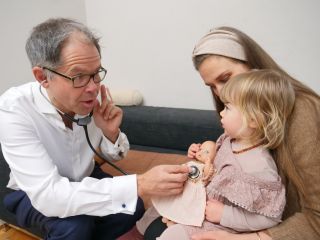Authenticity
Trust Me, I'm a Doctor
The power of authentic connection.
Posted May 6, 2024 Reviewed by Michelle Quirk
Key points
- Patients and clients long to be seen, heard, and understood by their caregivers.
- When we’re not being authentic and fully engaged, the quality of our care is negatively affected.
- Remembering the sacredness of our work can help us cultivate connection and healing.
In the realm of health care, where intricate knowledge meets compassionate care, lies an often overlooked but profoundly impactful element: the human connection. As health care professionals, we navigate a delicate dance between expertise and empathy, between treating symptoms and tending to souls. It's not just about what we know or what we do; it's about how we show up for the people we meet every day, and the depth and quality of attention we offer.
Picture this: a patient lying in a hospital bed, surrounded by beeping machines and sterile white walls. In that moment of vulnerability, what they crave isn't just medical expertise but a genuine human connection. They long to feel seen, heard, and understood—not as a mere case file, but as a whole person with fears, hopes, and dreams. It's within this space of authenticity that true healing can take place.
As busy health care professionals, we only have so much attention we can give. But it's not about the quantity; it's about the depth of that attention. When we show that we genuinely care about a patient's healing process—beyond just monitoring their vital signs—it can make all the difference. It's about being present, about being fully engaged in the moment, about demonstrating our sincere commitment to their well-being.

Authenticity is key. Patients can sense when their caregiver is just going through the motions, when they're being robotic rather than human. And it's authenticity that gives patients permission to open up, to trust, and, ultimately, to heal. As the experts in their own bodies, patients expect us to be super-authentic, to lead by example as we guide them through the portal of healing with vulnerability.
But how do we cultivate this authenticity? How do we get ourselves out of the way so we can truly serve others? It begins with recognizing the sacredness of our work—the privilege of being humble guests in something bigger than ourselves. It's about cultivating gratitude for the opportunity to serve while understanding that the act of serving transcends the deductive mind—it's about unity, not fragmentation.
In the practice of heart-based medicine, we must tap into what I like to call the "Naked Self"—the part of us that exists beyond titles and credentials, beyond the roles we play in society. It's about seeing the person before the professional, seeing the patient before the disease. When we connect with patients on this deeper level, we create an environment where healing can flourish.
So how do we access this Naked Self? It requires a willingness to set aside our preconceived notions and biases and to approach each interaction with openness and humility. It means recognizing that we are all interconnected—that the patient's healing journey is intricately linked with our own.
One way to cultivate this mindset is through practices such as mindfulness and meditation, which can help us quiet the noise of the mind and connect with our true essence. It's also about embracing vulnerability, being willing to show our own humanity in the presence of others. When we drop the facade of perfection and allow ourselves to be seen as we truly are, it creates a space for authentic connection to flourish.
But, perhaps most importantly, it's about recognizing that the healing process is not just about fixing physical ailments—it's about addressing the emotional, psychological, and spiritual dimensions of health as well. We have a responsibility to hold space for our patients' holistic well-being, to honor their individual journeys, and to support them in accessing their own inner resources for healing.
This power of authenticity in health care cannot be overstated. When we show up as our vulnerable true selves, when we approach each interaction with genuine care and compassion, we create the conditions for profound healing to occur. So let us embrace the Naked Self, let us honor the sacredness of our work, and let us strive to be humble servants in our chosen profession. Trust me, I'm a doctor—here to serve not just with expertise, but with heart and soul.


